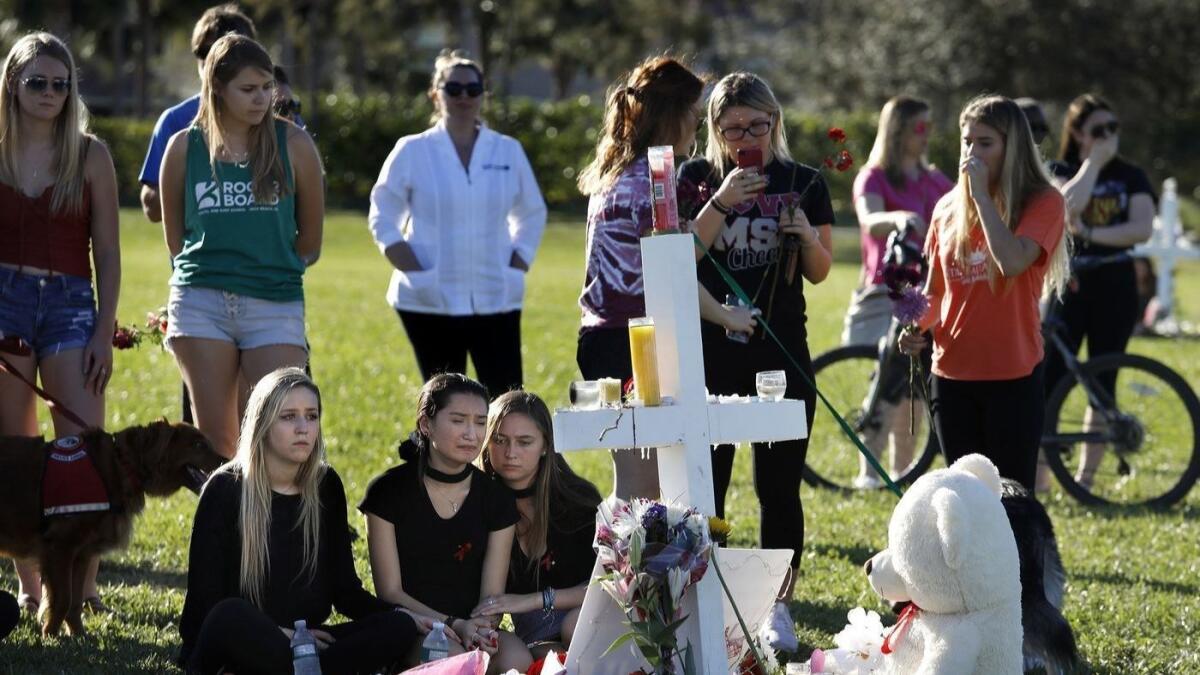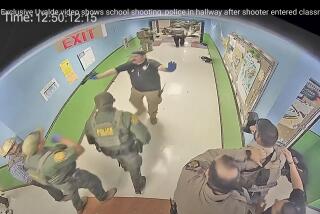Senate panel explores why the FBI missed warnings before Parkland school shooting — and whether gun measures can pass Congress
- Share via

Reporting from Washington — As students walked out of schools across the country Wednesday to protest gun violence, a Senate hearing examined law enforcement agencies’ failure to heed multiple warnings about the Parkland, Fla., man accused of killing 17 people at a high school, as well as the long record of failed gun control measures in Congress.
For the record:
1:15 p.m. March 16, 2018An earlier version of this article incorrectly identified acting FBI deputy director David Bowdich, giving his first name as Bill and misspelling his name as Bowditch on second reference. The story also incorrectly said Bowdich “sought to spread the blame” for FBI errors by disclosing that local law enforcement had made 30 to 40 visits to the alleged shooter’s home. Bowdich gave the number in response to a question from a lawmaker.
The Senate Judiciary Committee hearing took place as the accused gunman, Nikolas Cruz, 19, appeared in court in Fort Lauderdale, Fla., and was arraigned on a 34-count indictment in connection with the shooting rampage at Marjory Stoneman Douglas High School on Feb. 14.
Cruz did not speak and a plea of not guilty was entered on his behalf after state prosecutors filed notice that they would seek the death penalty in the case.
David Bowdich, the FBI’s acting deputy director, told the Senate panel that the agency obviously erred when it failed to follow up on a long, detailed warning on a tip line that Cruz was “going to explode.”
“We made mistakes here, no question about it,” Bowdich said. “That said, even if we had done everything right, I’m not sure we could have stopped the attack.”
He acknowledged that FBI agents missed an opportunity to find and quiz Cruz and to alert local law enforcement in Florida that he posed a possible danger. Cruz had been expelled from high school for disciplinary reasons and had been the subject of dozens of complaints to local police.
Bowdich said a close friend of the Cruz family had called the FBI’s tip center on Jan. 8 with a “very explicit” warning, saying Cruz had purchased weapons, was mutilating small animals, had threatened his mother with a rifle and talked about the terrorist group Islamic State.
The tip center employee discussed the report with a supervisor but both agreed to close the matter without forwarding the report to FBI agents or to local police, Bowdich said.
He said the two had “different recollections” about their conversation and that an internal investigation is underway.
An FBI agent also failed to follow up after Cruz posted an ominous video on YouTube last September in which he vowed, “I’m going to be a professional school shooter.” Bowdich said the agent could not identify the person who posted the video, although Cruz had used his real name.
Bowdich said the agent looked at social media and other computer sources but did not try to trace the poster’s internet address.
None of the FBI agents or employees has been disciplined for what Bowdich described as “judgment calls.” He added, “These employees have due process like anyone else.”
In response to a question, Bowdich said local law enforcement had made 30 to 40 visits to Cruz’s home after receiving reports of threats or other problems.
Lawmakers made clear their dismay, although they offered no clear solutions.
“It’s my impression that the man did everything but take out an ad in the paper saying, ‘I’m going to kill someone,’” said Sen. Lindsey Graham, (R-S.C.)
Throughout the hearing, Democratic senators said new laws are urgently needed to improve background checks for gun purchases, and to ban the sale of assault-style semiautomatic weapons, even as they conceded that the proposals faced long odds of winning approval.
Several angrily cited the long record of gun control bills that have died in Congress, including measures that were proposed after 26 students and teachers were massacred in Sandy Hook Elementary School in Newtown, Conn., in December 2012.
“We cannot continue to sit in this room and other rooms week after week and simply do nothing,” said Sen. Dianne Feinstein (D-Calif.), noting that she has again proposed reimposing a ban on the assault-style rifle that Cruz used. She said mass shootings have steadily increased since an earlier ban expired in 2004.
Under existing law, the Bureau of Alcohol, Tobacco, Firearms and Explosives, known as the ATF, is barred from computerizing its gun ownership records. They are kept on paper instead, a move heavily promoted by gun-rights activists who seek to limit gun regulations.
“Congress has forced you to go back to the 19th century,” said Sen. Dick Durbin (D-Ill.) told Thomas Brandon, acting director of the ATF.
“I am not going to lie, Senator,” Brandon responded. “It’s not the optimum, but it’s the law and we comply with the law.”
The hearing was packed with gun-control activists who cheered calls for stiffer gun laws and expressed frustration that none appeared likely to pass.
“A lot of talk and not a lot of action,” said Trish Petty, who wore a red T-shirt from the group Moms Demand Action. The National Rifle Assn. “still has a huge stranglehold on the people up there asking questions.”
The House on Wednesday overwhelmingly passed a bipartisan bill that provides grants to states to train teachers to be alert to threats of gun violence – but has no gun control provisions. The White House said it would work with the Senate to pass the bill.
“This administration is pleased with the progress we have made toward securing our schools over the last few weeks alone, and looks forward to working with the Senate to protect America’s students,” the White House said in a statement.
After the Parkland school shooting, President Trump vowed to defy the NRA and push for a comprehensive gun control bill that would raise the age limit to purchase rifles, impose near universal background checks and renew a ban on assault-style rifles.
Trump abandoned those promises on Monday, offering a far more modest plan that would provide weapons training for teachers and create a commission to study other responses to school shootings.
At the hearing Wednesday, Katherine Posada, a Marjory Stoneman Douglas teacher, recounted how students in her honors class were discussing Shakespeare’s “Macbeth” when the shooting erupted. They huddled in terror as she fought her panic.
She said bluntly that Congress needed to act to control weapons — and that arming teachers was not the answer.
“The fact that a 19-year-old can go into a gun store and buy a semiautomatic weapon and a high-capacity magazine … that is insane to me,” she said.
“This is not a partisan issue,” she said. “The children of Republicans are not immune to bullets.”
Twitter: @jtanfani
UPDATES:
1:20 p.m.: This story was updated with House vote on a bill to train teachers.
This story was originally posted at 12:45 p.m.
More to Read
Get the L.A. Times Politics newsletter
Deeply reported insights into legislation, politics and policy from Sacramento, Washington and beyond. In your inbox three times per week.
You may occasionally receive promotional content from the Los Angeles Times.











